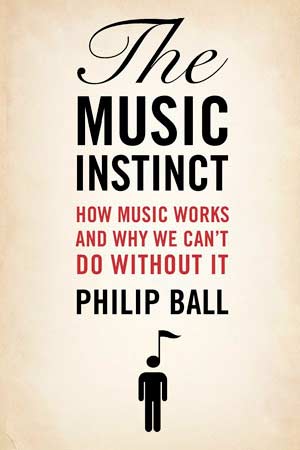 The Music Instinct: How music works, and why we can’t do without it by Philip Ball
The Music Instinct: How music works, and why we can’t do without it by Philip Ball
The Music Instinct offers the first comprehensive, accessible survey of what is known – and what remains unknown – about how music works: why we can comprehend it, why we are moved by it, why we make music and what roles it serves in culture and society.
It also advances some new ideas about those questions, pointing out where there are current gaps in our enquiries and investigations and suggesting new directions.
It will help the reader understand what is happening when they listen to music: how their brain is decoding the complex sound signal, discerning patterns and regularities and forming interpretations and expectations that create a sense of aesthetic pleasure – or not, as the case may be.
In this way, the book will not only enhance readers’ appreciation of the music they love, but also encourage them to look at all music in a new light and perhaps to begin exploring music that previously seemed opaque or dull or daunting.
BUY ON AMAZON
 Covering not only popular and classical Western music but also music of several non-Western cultures, the book argues that almost anyone can learn to appreciate music, and almost everyone can learn to perform it. Most of us are, indeed, already musical ‘experts’ without knowing it.
Covering not only popular and classical Western music but also music of several non-Western cultures, the book argues that almost anyone can learn to appreciate music, and almost everyone can learn to perform it. Most of us are, indeed, already musical ‘experts’ without knowing it.
The book questions some of the popular ideas that musicians and musicologists have advanced about the nature of music: for example, that scales and harmony have their origins in acoustic physics; that emotion in music is all about expectations and their violation; and the numerous tidy but untestable stories told about the evolutionary origins of music. The Music Instinct celebrates its topic while taking a sceptical, questioning approach to the current theories advanced to explain it. By doing so, it challenges some of the fundamental assumptions we hold about music and its role in our cultures.
Longlisted for the Samuel Johnson Prize, 2010
Shortlisted for the Royal Philharmonic Society Awards, 2011
BUY NOW on Amazon
Bodley Head (February 2010) ISBN 1-847-92088-8
US edition published by OXFORD UNIVERSITY PRESS (September 2010)
